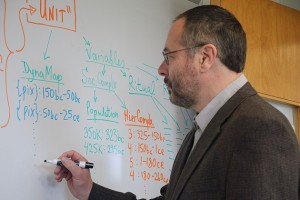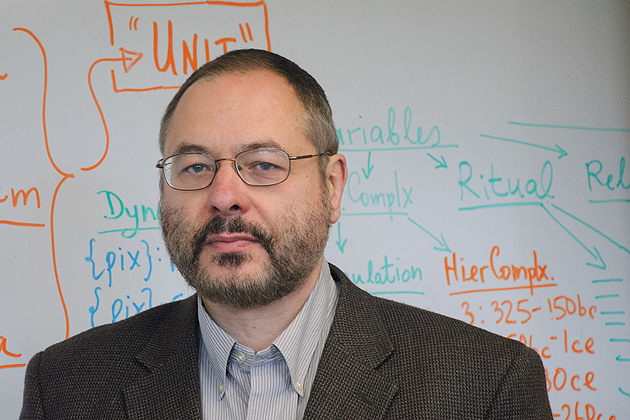
Can math be used to better understand history?
UConn biology professor Peter Turchin is doing just that, through complex mathematical algorithms. He spoke about his work in an Academic Minute on PBS station WAMC.
Is history just “one damned thing after another”? If not, if there are general principles shaping the broad patterns of history, we should be able to capture them with mathematical models. But would you believe that a mathematical model can predict, with startling accuracy, where and when major civilizations arose?
Before I embarked on my most recent project, I might not have thought so either. But recently, my colleagues and I have developed just such a model. We used a computer simulation to reconstruct the time period between 1500 BC and 1500 AD in the Old World – Africa, Europe, and Asia.
We built the model under the premise that large, cohesive states with large populations arise from intense competition between smaller societies, usually in the form of warfare. The strength of such competition depended generally on the development of technology, like metal weaponry, chariots, and cavalry; and on the geographic landscape. We tested our model against the actual historical record, and it was able to predict with excellent accuracy the rise and fall of such great empires as those in Mesopotamia, Egypt, China and India.
These types of models are part of a new field of science my colleagues and I call Cliodynamics, after the Greek muse of history. We use the principles of cultural evolution and complexity science to take real-world data and make specific predictions about history that can be rigorously tested using the scientific method. We can even use math to make sense of such events as the recent U.S. government shutdown.
Although we can’t always predict everything about the future, our research shows that there are general and predictable mechanisms at work shaping the history of our world.
Listen to his talk here.
This talk was first aired on WAMC, the PBS station in Albany, N.Y., as an Academic Minute, and was also hosted by Inside Higher Education. The Academic Minute features researchers from colleges and universities around the world. Thanks to WAMC for the station’s permission to post these spots.
In addition to his appointment as professor of ecology and evolutionary biology at the University of Connecticut, Turchin is an adjunct in the departments of Anthropology and Mathematics at UConn, and is vice-president and a founding member of the Board of Directors of the Evolution Institute. He’s also the editor-in-chief of Cliodynamics: The Journal of Theoretical and Mathematical History and the editor of the Social Evolution Forum.
Read more in a Wired magazine article: Mathematicians Predict the Future With Data From the Past.



